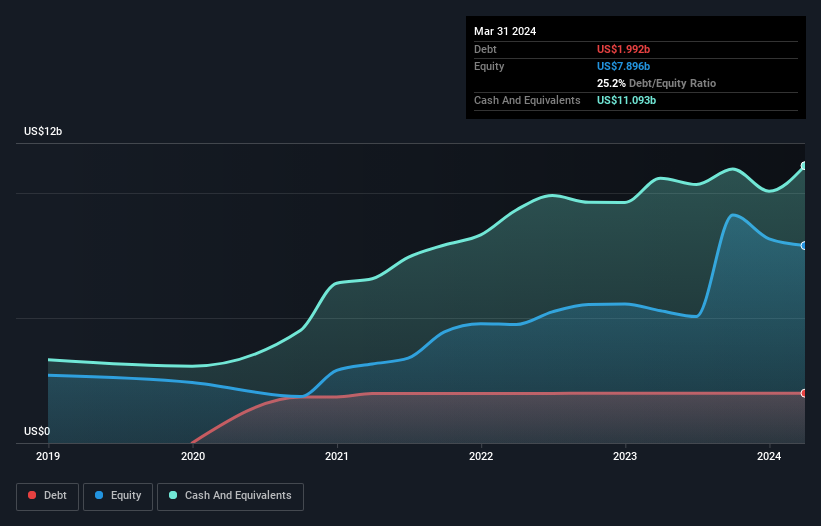- United States
- /
- Hospitality
- /
- NasdaqGS:ABNB
These 4 Measures Indicate That Airbnb (NASDAQ:ABNB) Is Using Debt Reasonably Well

The external fund manager backed by Berkshire Hathaway's Charlie Munger, Li Lu, makes no bones about it when he says 'The biggest investment risk is not the volatility of prices, but whether you will suffer a permanent loss of capital.' It's only natural to consider a company's balance sheet when you examine how risky it is, since debt is often involved when a business collapses. We can see that Airbnb, Inc. (NASDAQ:ABNB) does use debt in its business. But should shareholders be worried about its use of debt?
Why Does Debt Bring Risk?
Debt assists a business until the business has trouble paying it off, either with new capital or with free cash flow. In the worst case scenario, a company can go bankrupt if it cannot pay its creditors. While that is not too common, we often do see indebted companies permanently diluting shareholders because lenders force them to raise capital at a distressed price. By replacing dilution, though, debt can be an extremely good tool for businesses that need capital to invest in growth at high rates of return. The first thing to do when considering how much debt a business uses is to look at its cash and debt together.
View our latest analysis for Airbnb
What Is Airbnb's Net Debt?
The chart below, which you can click on for greater detail, shows that Airbnb had US$1.99b in debt in March 2024; about the same as the year before. But it also has US$11.1b in cash to offset that, meaning it has US$9.10b net cash.

How Healthy Is Airbnb's Balance Sheet?
According to the last reported balance sheet, Airbnb had liabilities of US$14.1b due within 12 months, and liabilities of US$2.50b due beyond 12 months. Offsetting these obligations, it had cash of US$11.1b as well as receivables valued at US$175.0m due within 12 months. So its liabilities total US$5.37b more than the combination of its cash and short-term receivables.
Of course, Airbnb has a titanic market capitalization of US$94.0b, so these liabilities are probably manageable. However, we do think it is worth keeping an eye on its balance sheet strength, as it may change over time. Despite its noteworthy liabilities, Airbnb boasts net cash, so it's fair to say it does not have a heavy debt load!
But the bad news is that Airbnb has seen its EBIT plunge 14% in the last twelve months. If that rate of decline in earnings continues, the company could find itself in a tight spot. The balance sheet is clearly the area to focus on when you are analysing debt. But it is future earnings, more than anything, that will determine Airbnb's ability to maintain a healthy balance sheet going forward. So if you want to see what the professionals think, you might find this free report on analyst profit forecasts to be interesting.
Finally, a business needs free cash flow to pay off debt; accounting profits just don't cut it. Airbnb may have net cash on the balance sheet, but it is still interesting to look at how well the business converts its earnings before interest and tax (EBIT) to free cash flow, because that will influence both its need for, and its capacity to manage debt. Happily for any shareholders, Airbnb actually produced more free cash flow than EBIT over the last three years. That sort of strong cash generation warms our hearts like a puppy in a bumblebee suit.
Summing Up
While it is always sensible to look at a company's total liabilities, it is very reassuring that Airbnb has US$9.10b in net cash. And it impressed us with free cash flow of US$4.2b, being 249% of its EBIT. So we don't have any problem with Airbnb's use of debt. Above most other metrics, we think its important to track how fast earnings per share is growing, if at all. If you've also come to that realization, you're in luck, because today you can view this interactive graph of Airbnb's earnings per share history for free.
When all is said and done, sometimes its easier to focus on companies that don't even need debt. Readers can access a list of growth stocks with zero net debt 100% free, right now.
New: Manage All Your Stock Portfolios in One Place
We've created the ultimate portfolio companion for stock investors, and it's free.
• Connect an unlimited number of Portfolios and see your total in one currency
• Be alerted to new Warning Signs or Risks via email or mobile
• Track the Fair Value of your stocks
Have feedback on this article? Concerned about the content? Get in touch with us directly. Alternatively, email editorial-team (at) simplywallst.com.
This article by Simply Wall St is general in nature. We provide commentary based on historical data and analyst forecasts only using an unbiased methodology and our articles are not intended to be financial advice. It does not constitute a recommendation to buy or sell any stock, and does not take account of your objectives, or your financial situation. We aim to bring you long-term focused analysis driven by fundamental data. Note that our analysis may not factor in the latest price-sensitive company announcements or qualitative material. Simply Wall St has no position in any stocks mentioned.
About NasdaqGS:ABNB
Airbnb
Operates a platform that enables hosts to offer stays and experiences to guests worldwide.
Flawless balance sheet and fair value.
Similar Companies
Market Insights
Community Narratives



